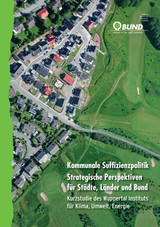
Whether it's financial incentives for moving to smaller flats, mandatory bicycle parking spaces or public tenders based on social and environmental criteria - there are a variety of ways to reduce the consumption of space, energy and materials in municipalities. This is shown in a study by the Wuppertal Institute for Climate, Environment and Energy entitled "Kommunale Suffizienzpolitik. Strategic perspectives for cities, federal states and the federal government" commissioned by the Bund für Umwelt und Naturschutz Deutschland (BUND). Using concrete examples, the study presents the instruments available to municipalities and federal and state governments to create incentives for resource-conserving living. Measures are recommended for the areas of housing, mobility and public tenders.
Christine Wenzl, BUND sustainability expert: "Every year, an area the size of Frankfurt is lost in Germany for new residential, commercial and transport buildings. For years, the number of cars, their performance and the distance travelled by car have been increasing. Cities are growing into the surrounding countryside, biodiversity is dwindling and the high energy demand is destroying climate protection efforts. The study proves: There is enormous potential to turn things around at the municipal level and significantly reduce resource consumption."
In terms of housing, municipalities could, for example, take advantage of the sometimes considerable vacancy of offices and support their conversion into flats. Promoting cooperative housing with shared living, working and communal spaces would also contribute to resource conservation, as examples in the study showed. In order to strengthen cycling as well as public transport, state governments could - as happened in Lower Saxony - among other things change the building code so that car parking spaces are no longer required in new buildings. Instead, the federal states could make parking spaces for bicycles mandatory.
Often, the competition among municipalities for purchasing power, inhabitants and commercial revenues stands in the way of resource-saving development. "Even in regions with stagnating or even shrinking populations, new commercial and residential areas and transport routes continue to be built. This is where the federal government can take countermeasures, for example by imposing a moratorium on land consumption," said study author Michael Kopatz of the Wuppertal Institute. A nationwide restriction on new construction would enable municipalities to turn to existing alternatives without having to fear competitive disadvantages.
More information
Study "Municipal Sufficiency Policy. Strategic perspectives for cities, federal states and the federal government". download (PDF, 1 MB)
Further information on the study as well as graphics for download can be found at www.bund.net/stadtlandglueck
Keywords:
Stakeholders, Soil & land consumption, DE-News, Communities, Media, New books and studies, News Blog Lower Saxony, Quarters, SDG 2030, Settlements, Social / Culture, Sufficiency, Environmental policy, Housing policy, Ecology



